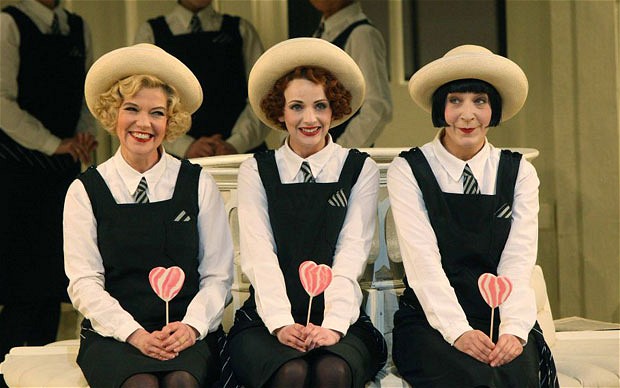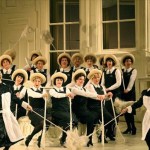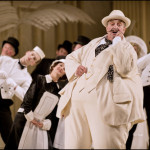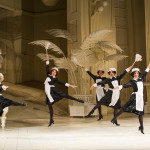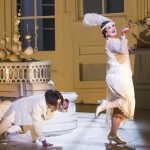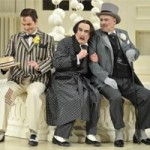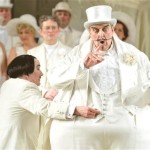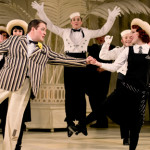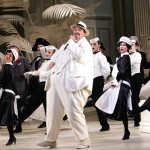This being a revival of Jonathan Miller‘s famed and oft-repeated 1987 production of Gilbert and Sullivan‘s finest work, The Mikado, you can imagine a proportion of the audience (who were packed in like the proverbial small edible canned fish) came primarily for the familiarity, much as they would choose restaurants specialising in comfort food like fish and chips, and none the worse for that. This interpretation is very much the chicken tikka masala of English light opera, for although it is nominally set in medieval Japan (and G&S works are set in all manner of countries, real and mythical) there is little more quaintly English – and few can build on the sly mickey-taking of other countries better than Mr Miller.
In fact, Miller’s vision of The Mikado is described on the ENO’s website thus:
Set in an ever-so English 1930s seaside hotel, Jonathan Miller’s Marx Brothers-inspired song-and-dance Mikado is a popular hit with audiences of all ages. The combination of Gilbert’s virtuosic wit, Sullivan’s memorable melodies and Miller’s hilarious antics is irresistible.
Entertainment value notwithstanding, production values are high. To me, the set looked more like a stylised 1930s trompe l’oeuil version of the Raffles hotel, cast in ivory, the troupe l’oeuil being in the form of corridors off to each wing being set on a considerable slope to create an impression of greater size, but thereby giving the cast ample opportunity to play for laughs by pretending the gradient is akin to the famed north face of the Eiger.
Costumes too err towards the colonial (that is to say, they are strictly formal for the nobility and indeed for the assorted maids, bus boys and other domestic staff), especially the exquisite cream linen suit and panama hat adopted by the Mikado himself (Richard Lloyd), albeit with a ton and a half of padding adding for good measure. We first see Ko-Ko (played here by the master of the role, Richard Suart) in his tennis gear, though he quickly changes for fear of being out dressed by Pooh-Bah’s perfect morning suit with top hat.
The schoolgirls are a vision of jolly hockey sticks English public school uniforms, though on this occasion they have been playing lacrosse. Even from the distance of the upper circle, one can see they are long in the tooth for schoolgirls – however beautifully they sing, and in that respect the solos are handled beautifully, especially, I thought, Mary Bevan‘s Yum-Yum performing The Sun Whose Rays Are All Ablaze.
Mise-en-scène is therefore effective and a splendid backdrop to the action. Just a word on audibility before I continue: by and large, enunciation is admirable, aided by Gilbert’s libretto being displayed on the text screen above the proscenium arch. However, this does not apply either to dialogue or to lyrics updated in the course of the production, of which the prime example is Suart’s specialty, Ko-Ko’s list song (AKA As Someday It May Happen.) I could not hear all Suart’s words, but I do know this from The London List’s review, here included with an introduction for anyone not familiar with the song (there must surely be someone!):
A perennial highlight of this production — and one of the possible reasons behind its remarkable longevity — is the infamous ‘Little List’; compiled by Suart afresh each year, it points out those from modern society who, should they succumb to a terminal case of capital punishment, would “not be missed”. The latest collection runs the gamut from the obvious (all the main political parties) to the notorious (Jeremy Clarkson, Volkswagen and a certain pig) to the personal (an Italian opera house that apparently still owes Suart a five-figure sum).
In fact, the words and music were equally a joy and pleasure throughout the show, admirably kept in balance in spite of Gilbert and Sullivan’s protestations that each deferred to the other’s contributions. Gilbert’s libretto remains as dazzlingly sharp and witty as the day they were first performed in 1885, and Sullivan’s score is equally fresh and vital, with tunes the audience can hum to its heart’s content. Even non-G&S fans will be surprised how many of the melodies have lingered in their respective subconsciouses.
I am happy to report that the current cast make an excellent job of communicating the immediacy of the songs. Lloyd in particular brought a rich and resounding bass to the Mikado, contrasting well with Katisha’s clear mezzo – though I doubt Yvonne Howard can be very pleased that her character is described in the programme as “an elderly lady in love with Nanki-Poo.) Speaking of whom, Anthony Gregory has a pleasing tenor voice and made more than a decent fist of the opener Wandering Mistrel.
Thankfully it was not just the songs that entertained the audience. The assorted shenanigans going on in the background while Merry Madrigal (actually one of the duller musical numbers) is sung eclipse the song many times over.
In fact, the Miller production is so much more than acting, singing, larking around and knowing jokes. It contains its fair share of satire, slapstick and plenty of intricately choreographed dance numbers, such that you could be excused for thinking you had walked into a seaside pier variety show by mistake. The glitz, glamour and razzamatazz are there in abundance, to the extent that you sometimes wonder how G&S can make such a light and frothy confection out of a plot that is essentially about the “humane” Mikado whose capital punishment policy is brought into question – which might seem dangerously close to reality in light of terrorist executions. Judge for yourself by the words below.
The key question is whether you can keep on repeating the same production every other year and retain the sparkle and relevance. An auditorium full to overflowing tells you the audience has not deserted The Mikado, even allowing for ever-rising seat prices. It is fair to assume they include a proportion who, like myself, had never seen this production before, and another quota who come along every time and enjoy, much as there always some viewers with long memories who would happily watch Carry On Camping every year without fail.
Familiarity does not dim what has become the standard for all productions, such that performing it as a mickey-take on the Japanese seems superfluous. As I began this review, The Mikado is quintessentially English, and says much more about us than ever it does about the Japanese.
PISH-TUSH
Our great Mikado, virtuous man,
When he to rule our land began,
Resolved to try
A plan whereby
Young men might best be steadied.So he decreed, in words succinct,
That all who flirted, leered or winked
(Unless connubially linked),
Should forthwith be beheaded, beheaded, beheaded
Should forthwith be beheaded.And I expect you’ll all agree
That he was right to so decree.
And I am right,
And you are right,
And all is right as right can be!CHORUS
And you are right.
And we are right,
And all is right, is right as right can be!
And all is right as right can be!
right as right can be!PISH-TUSH
This stern decree, you’ll understand,
Caused great dismay throughout the land!
For young and old
And shy and bold
Were equally affected.
The youth who winked a roving eye,
Or breathed a non-connubial sigh,
Was thereupon condemned to die—
He usually objected, objected, objected,
He usually objected.And you’ll allow, as I expect,
That he was right to so object.
And I am right,
And you are right,
And everything is quite correct!CHORUS
And you are right,
And we are right,
And everything is quite, is quite correct,
And everything is quite correct,
All is quite correct!PISH-TUSH
And so we straight let out on bail
A convict from the county jail,
Whose head was next
On some pretext
Condemned to be mown off,
And made him Headsman, for we said,
“Who’s next to be decapited
Cannot cut off another’s head
Until he’s cut his own off, his own off, his own off.
Until he’s cut his own off.”And we are right, I think you’ll say,
To argue in this kind of way;
And I am right,
And you are right,
And all is right—too-looral-lay!CHORUS
And I am right,
And you are right,
And you are right,—too-looral-lay!PISH-TUSH and CHORUS
And we are right,
And all is right,
And all is right![Exeunt CHORUS.]
[Enter POOH-BAH]
NANKI-POO (Spoken) Ko-Ko the cheap tailor, Lord High Executioner of Titipu! Why, that’s the highest rank a Citizen can attain!
POOH-BAH (Spoken) It is. Our logical Mikado seeing no moral difference between the dignified judge that condemns a criminal to die, and the industrious mechanic who carries out the sentence, has rolled the two offices into one, and every judge is now his own executioner.
NANKI-POO (Spoken) But how good of you (for I see that you are a nobleman of the highest rank) to condescend to tell all this to me, a mere strolling minstrel!
POOH-BAH (Spoken) Don’t mention it. I am, in point of fact, a particularly haughty and exclusive person, of pre-Adamite ancestral descent. You will understand this when I tell you that I can trace my ancestry back to a protoplasmal atomic globule. Consequently, my family pride is something inconceivable. I can’t help it. I was born sneering. But I struggle hard to overcome this defect. I mortify my pride continually. When all the great officers of state resigned in a body, because they were too proud to serve under an ex-tailor, did I not unhesitantly accept all their posts at once?
PISH-TUSH (Spoken) And all the salaries attached to them? You did.
POOH-BAH (Spoken) It is consequently my degrading duty to serve this upstart as First Lord of the Treasury, Lord Chief Justice, Commander-in-Chief, Lord High Admiral, Master of the Buckhounds, Groom of the Back Stairs, Archbishop of Titipu, and Lord Mayor, both acting and elect, all rolled into one. And at a salary! A Pooh-Bah paid for his services! I a salaried minion! But I do it! it revolts me, but I do it!
NANKI-POO (Spoken) And it does you credit.
POOH-BAH (Spoken) But I don’t stop at that. I go and dine with middle-class people on reasonable terms. I dance at cheap suburban parties for a moderate fee. I accept refreshment at any hands, however lowly. I also retail State secrets at a very low figure. For instance, any further information on Yum-Yum would come under the head of a State secret. (Aside) Another insult, and, I think, a light one!

